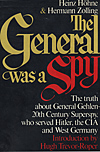 Coward, McCann & Geoghegan, 1971, $?, ISBN ?, 376 pgs., hardback
Coward, McCann & Geoghegan, 1971, $?, ISBN ?, 376 pgs., hardback
I found this at a used book sale at the local church for $1, and was surprised to find this "Book Club Edition" had no ISBN number. And I must admit I know precious little about espionage operations. But I also figured that anyone who could serve Hitler, the CIA and West Germany would be an interesting read.
This translation reads fairly well, but has a somewhat "translated" feel to it. Idioms are somewhat different. For example, I'd use the phrase "small potatoes" to refer to something inconsequential. Hohne and Zolling use "small beer." Things like that crop up throughout the book. So, the early chapters were a bit difficult to get into. However, once you adapt to the rhythm of the prose, the book begins to grow on you.
General Reinhard Gehlen was born April 3, 1902 and determined to be an Army officer at an early age. He missed WWI, but entered the officer's Corp as Cadet on 1 January 1921, posted to 6th Light Artillery Regt. With a reduced Army size, he found the climb up the ladder slow. He became a 2nd Lt. on 1 December 1923. He transferred to cavalry n 1926, promoted to Lt. in 1928 and posted back to the artillery.
He married in 1931 into Prussian nobility, and from 1 October 1933 to June 1935 attended "Commanders Assistants Training" (something like the US War College), joining the General Staff later in 1935. On 6 October 1936, he was posted to General Staff Operations, Section, but was transferred to the fortification section n 1937. In November 1938, he was back in the artillery. At the outbreak of WWII, was a Senior general staff officer of 213th Infantry Division, and participated in the Poland Campaign.
In late 1939, he was back at General Staff in fortifications, where he planned German fortifications in Poland. In October 1940, he transferred to Operations, Eastern Group. He worked on the German drive through Yugoslavia and Greece, and later worked on transport problems for Operation Barbarossa. For these three years he was under the Chief of Staff, Halder, who ultimately replaced the head of intelligence operations responsible for the USSR with Gehlen on 31 March 1942.
So began the career of this superspy, and this is where the story picks up speed, detail, and interest. Gehlen is portrayed as a master organizer with intuitive grasp of people's abilities, as well as a slipperiness of being able to blame others for failings. The operations set up to gather intelligence during WWII are fascinating, though ultimately futile. Gehlen was a proponent of forming a Russian army to fight against the communists, but Hitler would have none of that. The coup of July 20, 1944 found Gehlen's friends arrested, but he slipped away, ultimately fired by Hitler in the waning days of WWII for his pessimistic intelligence.
That's when he did a smart thing--a real smart thing. He photostatted his intelligence, and stuffed it in 50 boxes, which he proceeded to move to Bavaria and bury, waiting for the Americans.
Ultimately he presented US intelligence with information about Soviet troops, production, and other military and industrial capabilities. When the US-USSR split occurred, he was Reinhard-on-the-spot to suggest he rebuild the intelligence organization under CIA supervision.
Here is absolutely brilliant prose explaining how the "Gehlen Organization" was created, run, and prospered. The anecdotal events are well written, and you get a real sense of the intrigue and skullduggery that occurred in the late 40s and through the 50s.
Eventually, the Gehlen Organization is absorbed into the West German government after a number of turf battles, and Gehlen now serves his third master. It is also here that he began to slip, for in expanding his operation to be a worldwide organization, too many friends and cronies falter, Soviet counterspy operations succeed, and information dries up. In short, he got sloppy.
And so began his fall from grace and power. On 30 April, 1968, Gehlen "retired."
All in all, this book offers a fascinating look at the spy service of Germany. An appendix summarizes the military intelligence of Germany from the early 1800s. The General Was a Spy was well worth the $1 and you might be able to find a copy in the library.
Back to List of Book Reviews: Modern
Back to Master Book Review List
Back to Master Magazine List
© Copyright 2001 by Coalition Web, Inc.
This article appears in MagWeb (Magazine Web) on the Internet World Wide Web.
Other military history articles and gaming articles are available at http://www.magweb.com